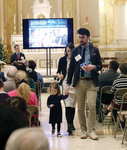

Humanae Vitae (“Of Human Life”), Pope St. Paul VI’s 1968 encyclical on married life and procreation, is winning a new audience among young people who strive to live the Catholic vision of family life in an ever-changing world. Speakers and participants at a daylong conference Dec. 1 at St. Joseph’s Seminary in Dunwoodie explored educational, scientific, pastoral and practical approaches to embracing the encyclical’s message 50 years after it was promulgated.
Humanae Vitae reaffirmed Church teaching that artificial conception is morally wrong. Dr. Kathleen Wither, director of the archdiocesan Family Life Office, said, “Fifty years ago, Paul VI’s positive message in Humanae Vitae about love, sex and marriage was lost amid the birth control controversy, resulting in widespread indifference and disregard for this important Church teaching. Today, this teaching continues to be rediscovered and deepened through examination of Pope St. John Paul’s themes and writings, and is reinvigorated through science, medicine and evolving technologies.”
Cassie and Kyle Moriarty described their experience with natural family planning (NFP) methods as “living life according to God’s plan.” Kyle was introduced to the idea as a student at a Catholic high school.
Cassie described herself as a former agnostic and atheist “who became Catholic because of NFP.”
“The science attracted me and then the beauty sealed the deal,” she said. “Once I dipped my toes in, I was drawn to Humanae Vitae and Pope St. John Paul’s Theology of the Body.
“Humanae Vitae was the first time I had heard that I could demand respect from the opposite sex. I ditched my birth control pill pack, became a practicing Catholic and an evangelist for NFP,” Cassie said.
She became pregnant with their four-year-old daughter Amata shortly after moving to New York from Montana. Cassie and Kyle did not yet have health insurance or steady employment. “The timing felt insane, but also right. God calls us at times when we think, ‘What? No way!’” she laughed.
Cassie learned she was pregnant shortly after she registered to train as a teacher of Fertility Education and Medical Management (FEMM), which is a comprehensive health program that teaches women to understand their bodies and recognize hormonal and other vital signs of health. It incorporates a free phone app to help track health and reproductive goals and includes medical testing and treatment consistent with the central role of reproductive endocrinology in the management of women’s health.
Cassie’s pregnancy was difficult and the newborn Amata had trouble breastfeeding, but Cassie’s experience as a FEMM teacher helped her navigate the pregnancy, birth and postpartum period.
She said women find that different methods of natural family planning serve their needs at different stages of their lives, but all share an openness to life. “Being open to life has little to do with fertility. It’s being open to the daily struggles, both good and bad, and being open to including God in the family unit. NFP is the tool that helps us navigate,” she said. “We only have to give God our faith and He will take care of us.”
Anna Halpine is chief executive officer of the FEMM Foundation and chairwoman of the board of St. John Fisher Seminary in Stamford, Conn. She described the complex “hormone dance” associated with women’s health and fertility and detailed the extreme variations in normal menstrual cycles. She said oral contraceptives are used as the standard medical protocol to treat acne, anemia, bleeding disorders, mood swings, irregular cycles and endometriosis.
Ms. Halpine said oral contraceptives are “a gateway drug” for young women because the hormones disrupt their systems and have negative side effects both at the time they are taken and later in life, including infertility. She said the FEMM protocol instead assesses potential hormonal imbalances and seeks to identify and treat their underlying causes.
“Women prefer health care to contraceptives,” Ms. Halpine said.
Conference participant Bonnie Halk from Holy Family parish on Staten Island said she became a FEMM teacher because “I’m a nurse and mother of three children. I learned about this late and I was angry. I wanted to be part of the solution, providing information and knowledge for the next generation.
“Schools talk about comprehensive sex education, but girls are not taught about how their hormones work together—they hear only that pregnancy is a dangerous disease. Fertility is not a disease. It’s part of God’s plan. Contraceptives hide problems and let underlying issues grow.”
The conference was sponsored by the archdiocesan Adult Faith Formation and Family Life offices and supported by a gift from Sean Fieler, president of Equinox Partners. Cardinal Dolan led the Angelus at noon and Auxiliary Bishop Peter Byrne was the main celebrant for the closing Mass.